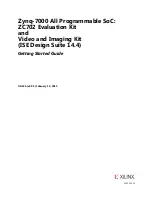
5. If necessary, enable the frame-synchronization logic of the sample rate generator.
After the required data acquisition setup is done (DXR[1,2] is loaded with data), set GRST = 1 in SPCR2 if
an internally generated frame-synchronization pulse is required. FSG is generated with an active-high edge
after the programmed number of CLKG clocks (FPER + 1) have elapsed.
Table 15-7. Input Clock Selection for Sample Rate Generator
SCLKME
CLKSM
Input Clock for Sample Rate Generator
0
0
Reserved
0
1
LSPCLK
1
0
Signal on MCLKR pin
1
1
Signal on MCLKX pin
15.4 McBSP Exception/Error Conditions
This section describes exception/error conditions and how to handle them.
15.4.1 Types of Errors
There are five serial port events that can constitute a system error:
• Receiver overrun (RFULL = 1)
This occurs when DRR1 has not been read since the last RBR-to-DRR copy. Consequently, the receiver does
not copy a new word from the RBRs to the DRRs and the RSRs are now full with another new word shifted in
from DR. Therefore, RFULL = 1 indicates an error condition wherein any new data that can arrive at this time
on DR replaces the contents of the RSRs, and the previous word is lost. The RSRs continue to be overwritten
as long as new data arrives on DR and DRR1 is not read. For more details about overrun in the receiver, see
.
• Unexpected receive frame-synchronization pulse (RSYNCERR = 1)
This occurs during reception when RFIG = 0 and an unexpected frame-synchronization pulse occurs. An
unexpected frame-synchronization pulse is one that begins the next frame transfer before all the bits of the
current frame have been received. Such a pulse causes data reception to abort and restart. If new data has
been copied into the RBRs from the RSRs since the last RBR-to-DRR copy, this new data in the RBRs is
lost. This is because no RBR-to-DRR copy occurs; the reception has been restarted. For more details about
receive frame-synchronization errors, see
.
• Transmitter data overwrite
This occurs when the CPU or DMA controller overwrites data in the DXRs before the data is copied to the
XSRs. The overwritten data never reaches the DX pin. For more details about overwrite in the transmitter,
see
• Transmitter underflow (XEMPTY = 0)
If a new frame-synchronization signal arrives before new data is loaded into DXR1, the previous data in the
DXRs is sent again. This procedure continues for every new frame-synchronization pulse that arrives until
DXR1 is loaded with new data. For more details about underflow in the transmitter, see
.
• Unexpected transmit frame-synchronization pulse (XSYNCERR = 1)
This occurs during transmission when XFIG = 0 and an unexpected frame-synchronization pulse occurs. An
unexpected frame-synchronization pulse is one that begins the next frame transfer before all the bits of the
current frame have been transferred. Such a pulse causes the current data transmission to abort and restart.
If new data has been written to the DXRs since the last DXR-to-XSR copy, the current value in the XSRs is
lost. For more details about transmit frame-synchronization errors, see
.
Multichannel Buffered Serial Port (McBSP)
896
TMS320x2806x Microcontrollers
SPRUH18I – JANUARY 2011 – REVISED JUNE 2022
Copyright © 2022 Texas Instruments Incorporated
Содержание TMS320 2806 Series
Страница 2: ......
















































